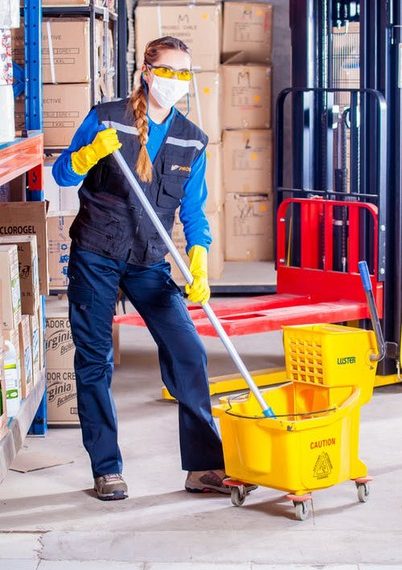Have you ever walked into a workspace and relished the feel of a clean, organized environment? It’s not just aesthetic; it’s about health, too. Cleanliness in corporate and medical offices isn’t something to be glossed over. With germs lurking around every keyboard and telephone, it’s no wonder that when flu season hits, sick days can become a common trend. But have you ever stopped to think about how regular cleaning could help keep those sick days at bay?
1. Reduction of Pathogens
Regular cleaning and disinfection of surfaces, equipment, and common areas help eliminate harmful pathogens, including bacteria and viruses, that can cause illness. By reducing the presence of pathogens in the office environment, cleaning helps prevent the spread of contagious diseases, such as colds, flu, and gastrointestinal infections, among employees and visitors.
How Germs Spread in the Workplace
To really grasp why regular cleaning matters, let’s discuss germ transmission. This isn’t just about colds and flu; there are a myriad of infections and viruses that can thrive in a corporate setting. Here are a few ways germs are commonly spread:
-
Shared equipment like phones and computers
-
Communal areas like break rooms and conference tables
-
High-touch surfaces like doorknobs and light switches
-
Airborne pathogens from coughs and sneezes
Regular cleaning interrupts this cycle, giving germs less opportunity to spread by ensuring surfaces are disinfected regularly. This proactive approach can make all the difference when it comes to keeping your team healthy.
2. Prevention of Cross-Contamination
Proper cleaning protocols in Cambridge, ON, help prevent cross-contamination between individuals and surfaces. High-touch surfaces, such as doorknobs, light switches, keyboards, and phones, can harbor germs and serve as vectors for disease transmission. Routine cleaning and disinfection of these surfaces help break the chain of transmission and reduce the risk of illness spreading throughout the office.
3. Improvement of Indoor Air Quality
Cleaning contributes to better indoor air quality by removing dust, allergens, and pollutants from the office environment. Dust mites, pollen, pet dander, and other airborne particles can trigger allergies and respiratory problems, leading to sick days among employees. Regular dusting, vacuuming, and air purification help minimize allergens and improve air quality, creating a healthier work environment.
4. Mitigation of Allergens
Office cleaning Cambridge helps mitigate allergens that can exacerbate allergy symptoms and respiratory conditions. Dust, mold spores, and pet dander are common allergens found in indoor environments, including office spaces. Thorough cleaning of surfaces, carpets, and upholstery removes allergens and reduces the risk of allergic reactions and respiratory discomfort among employees.
5. Promotion of Hygiene Practices
Cleaning promotes good hygiene practices among employees, reinforcing the importance of handwashing, respiratory etiquette, and personal cleanliness. Proper hand hygiene is one of the most effective ways to prevent the spread of infectious diseases. Clean and well-stocked restrooms, hand sanitizer stations, and hygiene reminders encourage employees to adopt hygienic behaviors, reducing the risk of illness transmission in the workplace.
6. Enhancement of Employee Morale and Productivity
A clean and organized work environment contributes to employee morale and productivity. Employees are more likely to feel motivated, engaged, and satisfied when they work in a clean and clutter-free space. A positive work environment promotes overall well-being and reduces stress, which can help strengthen the immune system and decrease the likelihood of illness-related absenteeism.
7. Compliance with Health and Safety Regulations
Maintaining a clean and sanitary workplace is essential for compliance with health and safety regulations. Corporate and medical offices are subject to various regulations and guidelines governing cleanliness, sanitation, and infection control. Adhering to these standards not only protects employees and visitors but also minimizes the risk of regulatory fines and penalties.
Implementing Effective Cleaning Protocols in the Office
So, how do you ensure your office is as germ-free as possible? It starts with a solid cleaning protocol. Developing and implementing a set of cleaning standards can help keep your office space in tip-top health. This should include:
-
A checklist of daily, weekly, and monthly cleaning tasks
-
Use of appropriate cleaning products that are effective against a wide range of germs
-
Training for staff on hygiene practices and proper use of cleaning materials
-
Specialized cleaning services for more demanding areas, like restrooms
These steps can ensure that your office isn’t just clean to the eye but is a truly healthy environment. Working with a professional cleaning team can further bolster these efforts, bringing in expertise that an in-house team may need to possess.
What Is The Role of Employees in Maintaining Cleanliness
It’s not just up to the cleaners to keep an office germ-free; employees play a crucial role as well. Simple habits such as washing hands, using sanitizer, and wiping down personal work areas can significantly cut down on the spread of germs. Encouraging a culture of cleanliness can have a profound effect on reducing sick days and maintaining a vibrant, healthy work environment.
Fostering a culture that values cleanliness involves:
-
Reminding staff of hand hygiene.
-
Having clear procedures for when they feel unwell.
-
Even considering flexible work arrangements to prevent the spread of illness.
Final Thoughts
Cleanliness is next to healthiness when it comes to the work environment. Gone are the days when a quick bin empty and desk wipe were sufficient. In today’s world, savvy businesses know that reducing sick days is synonymous with thorough, professional cleaning practices. Investing in cleaning services and fostering a workplace culture that prioritizes hygiene can help keep everyone in your office healthy and productive. Skip the sick days and step into a future where cleanliness drives success.



